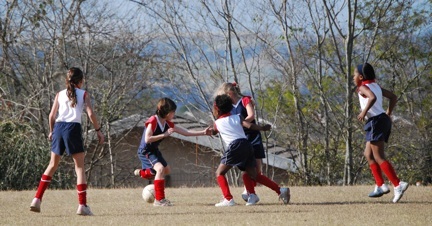Indi Cowie — a 16-year-old soccer phenom from North Carolina — can freestyle with the best. “The family garage is her laboratory,” notes the New York Times Magazine. “There are times when there’s an enormous bang and I wake up at 5 in the morning thinking there’s an intruder in the house,” says Indi’s father, Logan Cowie. “Then I realize it’s just Indi practicing her latest trick.” Interestingly, Indi plays with a boys’ club team rather than with her high school’s girls’ team. Would she rather be the best freestyler or the best soccer player in the world, she answers: “You mean I have to pick one? I can’t. Both.” Read the full article here.
Tag: girls

Remember ‘Feel it! It is here!’ and similar emotional tugs on our football-loving hearts and souls during the 2010 World Cup? A few weeks later, the country is due to host the CAF African Women’s Championship and the silence is deafening.
Media, the South African FA, government and the private sector are back to their usual ways, ignoring everything but the money-spinning elite men’s game. The most recent evidence of the continuing low status of the women’s game in South Africa (and Africa) is that the venues for the African Women’s Championship in October have yet to be decided.
After the World Cup, we are back to reality. Maladministration, commercial disinterest, and male condescension continue to hold African women’s football back. The more things change, the more they stay the same.
Life, Love, and Football in Kenya
In the year of Africa’s World Cup, it’s easy to overlook the host continent’s “other” players. Take these teenage girls in rural Kenya, for example. They organize, manage, referee, and play football in the Moving the Goalposts program. But this is not just about the game. Health education and social support are vital components of Moving the Goalposts.
Parents in Kilifi District have embraced the project: “But I have one problem in my house with Mbeyu [her daughter] and this issue of football,” says the mother of one of the players. “If she comes home from the football field and they have won, we’ll hear the whole story, how she scored, we’ll all laugh, the whole house will know. . . . But if they have lost, ha, Mbeyu—she’ll be ill and the whole house will be ill! . . . If she’s lost, there no laughter in the house.” (Read more of the girls’ stories in Sarah Forde’s gripping book Playing by Their Rules.)